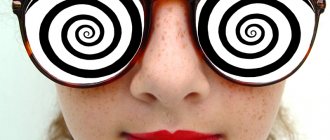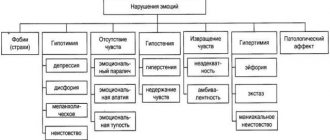Meaning of the concept
Affect, like any other emotional process, is a psychophysiological process of internal regulation of activity and reflects an unconscious subjective assessment of the current situation. Its unique characteristics are short duration and high intensity, combined with pronounced manifestations in behavior and the functioning of internal organs. In animals, the occurrence of affects is associated with factors directly affecting the maintenance of physical existence, associated with biological needs and instincts. The content and nature of a person’s affects undergo significant changes under the influence of society, and they can also arise in emerging social relationships, for example, as a result of social assessments and sanctions. Affect always arises in response to an already existing situation[1], mobilizing the body and organizing behavior in such a way as to ensure a quick reaction to it.
The meaning of the concept[ | ]
Affect arose during evolution to ensure a quick reaction of an individual in situations where decisive action is necessary. In the animal world, affect is associated with biological needs and instincts and is an important factor in survival. Affect, like any other emotional process, is a psychophysiological process of internal regulation of activity and reflects an unconscious subjective assessment of the current situation. Affect always arises in response to an already existing situation[1], mobilizing the body and organizing behavior in such a way as to ensure a quick reaction to it. Its unique characteristics are short duration and high intensity, combined with pronounced manifestations in behavior and the functioning of internal organs. The content and nature of a person’s affects has undergone a significant change under the influence of society; affects in people can arise as a result of social relationships, for example, as a result of insult or a feeling of injustice.
Boundaries of the concept
Experts distinguish between the concept of “ affect”
” and the concepts of “
feeling
”, “
emotion
”, “
mood
” and “
experience
”.
From feelings
,
moods
and
emotions
, affects are distinguished primarily by intensity and short duration, and also by the fact that they always arise in response to an
already existing
situation [1].
Under the worries
understand only the subjective mental side of emotional processes, which does not include physiological components.
Physiology of affect
The onset of affect is accompanied by changes in autonomic reactions (changes in pulse and respiration, spasm of peripheral blood vessels, protrusion of sweat, etc.), pronounced changes in the voluntary motor sphere (inhibition, excitation or overexcitation, impaired coordination of movements). The principle of operation of a lie detector, which records many physiological indicators of the body, is based on this effect.
Strong affect usually disrupts the normal course of higher mental processes - perception and thinking, sometimes causing a narrowing of consciousness or clouding [ source not specified 79 days
].
Crimes of passion
Actions of a criminal nature that are accompanied by a mental disorder not related to insanity are widely covered by criminal law. Today, the Criminal Code of the Russian Federation contains several articles establishing penalties for such acts. As a separate phenomenon, such a feature is not reflected in the legislation in any way.
In the law, the topic of affect is addressed by separate articles of the code that define acts that may be associated with such a disorder.
These include the following:
Art. 107 of the Criminal Code of the Russian Federation. It reflects the composition of the act, which implies the commission of murder in the presence of the deviation in question.- Art. 113 of the Criminal Code of the Russian Federation. It establishes a composition that is associated with harm to health, both severe and moderate, but also in the presence of a sudden disorder.
The work of psychiatrists concerns only those subjects in whom the disorder leads to serious consequences. Minor harm, beatings or other similar actions cannot be associated with passion.
Regardless of the nature of the act, it is necessary to determine the objective and subjective characteristics that form the corpus delicti of any crime.
In the criminal sphere, it is important to establish other circumstances that determine an action as illegal. Emotional anxiety is only one of several. However, it is important to understand whether the murder was caused by direct intent or whether the act was of a different nature.
For any act, it is important to determine the object, what is being harmed. The objective side is the manifestation of encroachment. This forms a set of objective conditions. Subjective ones include the characteristics of the person himself - the culprit, and the subjective side. It involves the presence of guilt - a person’s attitude towards what he does. Affect is a component of guilt.
Guilt is expressed only in the form of intent or negligence. Affect is accompanied by intent, but not planned, but caused by certain circumstances. In addition, the deviation itself is an optional feature that accompanies guilt and transforms into a mandatory one if it is necessary to determine the acts under the above articles.
In criminal law, to determine the nature of the act committed in the state in question, it is necessary to establish the following conditions essential to the case:
- intent, as the subjective side of an act;
- sudden excitement;
- uncontrolled actions leading to serious consequences;
- unacceptable, negative behavior on the part of the injured party, regardless of whether it was momentary or lasted for some time.
The last two provisions relate specifically to the objective side of the matter; without them, it will not be possible to determine such a state of a person.
The control point in determining the disorder is the planning of all actions, as well as the behavior of the perpetrator after the act has been completed. This affects the objective side of the issue. For example, if the fact of preparation for a crime is established or after the crime the person tried to hide traces, then the act cannot automatically be considered committed in the heat of passion. Suddenness refers not only to the manifestation of disorder, but also to the implementation of criminal actions.
Varieties of affect
- Physiological affect
is an affect caused by a single (one-time) psychotraumatic impact of the victim’s behavior. - Cumulative affect
is an affect caused by a long-term traumatic situation associated with the behavior of the victim. - Pathological affect
is affect caused by illness. - Interrupted affect
is an emotional state interrupted by external influence, unfolding according to certain psychological mechanisms and reaching affective depth. In such situations, we can talk about the interruption not of the pre-affective phase and the immediate moment of the affective explosion, but of the post-affective period.
Affect
Home \ AffectAffect is a multifaceted psychological phenomenon that has motivational, somatic, emotional, expressive and communicative components, as well as an associated representation, or cognitive component. It must be distinguished from emotion, feeling.
This term is borrowed by psychoanalysis from the German psychological tradition; it means any emotional-affective state - pleasant or unpleasant, vague or clear - manifested in a general mental tone or in a strong energetic discharge. According to Freud, every drive finds its expression at two levels: affect and representation.
Affect is a qualitative expression of a certain amount of instinctive energy and its varieties.
The concept of affect acquires great importance already in the first works of Breuer and Freud on the psychotherapy of hysteria and the discovery of the therapeutic significance of response. The source of a hysterical symptom is a traumatic event that has not found adequate release ( restricted affect ).
Only a memory that evokes a new experience of the original affect that was initially associated with it can be therapeutically effective.
Studying hysteria, Freud concluded that affect has no necessary connection with representation; they can be separated from each other (affect without representation, representation without affect): each of them has its own destiny. Freud spoke about various ways of transforming affect: “I know three mechanisms: 1) the mechanism of affect reversal (conversion hysteria), 2) the mechanism of affect displacement (obsessive states), 3) the mechanism of affect transformation (anxiety neurosis, melancholia).”
Freud formulated a hypothesis about the origin of what we experience in affect.
Affects are “repetitions of early and perhaps even pre-individual, vital experiences” that can be compared with “universal, typical, congenital hysterical attacks.”
Affects, according to Kernberg, are psychophysiological behavioral patterns, including a specific cognitive assessment, a specific facial expression, a subjective experience of pleasure and attraction or pain and disgust, as well as a pattern of muscular and neurovegetative discharge. Facial expression is part of a general communication pattern that distinguishes different affects.
Kernberg divides affects into primitive and derivative.
Primitive affects appear during the first two to three years of life and have qualities of intensity and globality, as well as a diffuse, undifferentiated cognitive element.
Derived affects are more complex, they consist of combinations of primitive affects that have been subjected to cognitive processing. Unlike primitive affects, they may not manifest all their components with equal strength, and their mental aspects gradually begin to dominate over psychophysiological and facial communicative ones.
Jacobson, in parallel with Brierley (1937), came to the conclusion that affects are not only processes of discharge, but complex and long-term phenomena of mental stress.
Psychoanalysis, psychotherapy for you; psychotherapist in Moscow.
Signs of affect
Mandatory signs
- Subjective unexpectedness of psychotraumatic effects.
- Subjective suddenness of the occurrence of an affective explosion.
- Explosive nature of emotional reaction.
- Partial narrowing of consciousness - fragmentation and incompleteness of perception: simultaneous (incomplete perception of the situation at a separate point in time) and successive (incomplete perception of the surrounding reality and one’s actions over time).
- Violations of voluntary regulation of activity - disorder of mediation of actions, disorder of control of actions, decreased ability to predict the results of actions, lack of prediction of long-term consequences of actions.
- Physical asthenia (exhaustion).
- Mental asthenia (exhaustion).
Additional signs
- A feeling of subjective hopelessness from the current situation.
- Unfavorable psychophysiological state (overwork, lack of sleep, somatic illness, etc.).
- Relating to a partial narrowing of consciousness - the filling of consciousness with experiences associated with psychotraumatic effects, elements of distorted (illusory) perception, elements of loss of a sense of the reality of the environment, elements of a feeling of alienation of one’s actions.
- Relating to violations of voluntary regulation of activity - motor automatisms (stereotypes), disturbances of speech activity, inconsistency of the aggressive actions of the accused with his value-semantic sphere, personality orientation or typical ways of reacting.
- A sharp change in vasomotor and other vegetative manifestations.
- Disorganization of mental activity.
- Incomplete awareness (misunderstanding) of what happened.
- Committing actions atypical for the personality psychotype (aggression, intention to harm oneself, even suicide, stupor)
The concept of affect in criminal law
First, let's figure out what a state of affect is..
In criminal law, affect means very strong emotional excitement or shock, which leads to the development of a short but violent emotional and mental reaction, which has a negative impact on the ability to think soberly and fully control one’s actions.
There are two types of affect - physiological and pathological.
Physiological affect is an emotional reaction to shocks, which causes disorganization of mental processes in the human body. Understanding of both the situation itself and the actions taken is lost.
Main characteristics of physiological affect:
- sudden nature of occurrence;
- explosive dynamics;
- short-term intensity, high intensity of the course;
- narrowing of consciousness, other disorganizing reactions;
- increased mobility, motor activity;
- vegetative shifts.
It is difficult to say exactly how long the state of passion lasts, but it is far from 15 minutes, as is commonly believed - this period is much shorter.
When the attack passes, asthenia and amnesia often develop; the person who committed the crime may indeed not remember individual details of the act.
For murder committed in a state of passion, criminal liability is provided, but if, in accordance with the current provisions of the Criminal Code of the Russian Federation 2020, evidence of affective behavior is collected, then the penalty can be mitigated.
Pathological affect is a short-term mental disorder , which is accompanied by deep clouding of consciousness, memory loss (complete or partial), impulsive acts, concentration of consciousness on traumatic experiences of the past with subsequent “discharge”. The person behaves inappropriately, speech becomes incoherent.
The pathological effect in judicial and criminal practice is much less common than the physiological one; as a rule, it develops against the background of serious mental illnesses (schizophrenia, manic-depressive psychosis, etc.).
The criminal legal meaning of affect extends specifically to physiological affect, since persons in a state of pathological affect (but this will still need to be proven) from a clinical point of view are insane.
The physiological state develops as a reaction to bullying, violence, severe insult, and other immoral and illegal actions.








